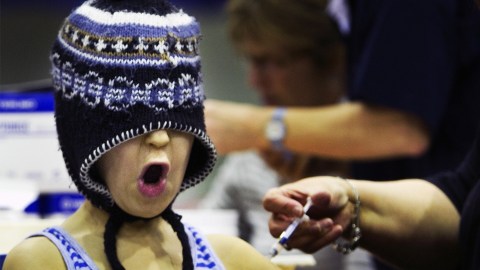Vaccines in no way cause autism, massive new study finds

- A massive new study finds absolutely no link between MMR vaccination and autism.
- Some question the expenditure of yet more research money on convincing conspiracy theorists.
- There are already 206 measles cases this year in the U.S., and the disease is up by 30% globally, despite previous near-eradication.
Measles were eliminated in the U.S. in 2000. Those were the days. Now it’s back, with 206 cases in 11 states already confirmed this year. Measles’ return is due to an increasing number of parents opting not to vaccinate their kids with the MMR vaccine, a 97% effective treatment against measles, mumps, and rubella. It’s a frustrating and frightening development for other parents who have done their part by having their own children vaccinated to keep these highly communicable diseases from spreading to everyone’s kids. The anti-vaxxer movement is based on research from a single UK-based doctor, Andrew Wakefield, who erroneously linked vaccinations to a rising incidence of children with autism. By 2010, more scrupulous researchers had completely debunked his claims. Yet widespread belief in his claims has proven remarkably resilient.
A comprehensive study just published in Annals of Internal Medicine and based on 10 years of data and half a million people hopes to finally, authoritatively, put Wakefield’s spurious and dangerous claims to rest. Of course, with anti-vaxxers motivated by paranoia, blame-shifting, a distrust of experts, or just stubbornness, it’s anyone’s guess if it will help.
Actually, more unvaccinated children are diagnosed with autism, the opposite of what anti-vaxxers believe.
(Hviid, et al)
The 2019 Danish vaccine-autism study
The study from scientists at Denmark’s Statens Serum Institut finds no statistical link whatsoever between the administration of MMR doses and the likelihood of developing autism. It also found no correlation between areas in which vaccines are administered and clusters of autism diagnoses occur. In fact, as the anti-vax movement has grown, so has the incidence of autism, from 1 out of 68 eight-year-olds having it in 2016, to 1 out of 59 in 2018.
The researchers studied the medical histories of Danish children born between 1999 and the end of 2010. Using population registries, they were able assess other risk factors — including sibling histories of autism — and look for correspondences between vaccinations and the occurrence of autism. Speaking of the statistics presented in the study, global health expert Saad Omer tells the Washington Post, “The appropriate interpretation is that there’s no association whatsoever.”

(Fred Tanneau/AFP/Getty Images)
Money well spent or wasted?
Dispositive as the new study’s evidence is, Omer and others consider it questionable to use research money sorely needed elsewhere to convince anti-vaxxers. As bioethicist Syd M Johnson says, “They are immune to facts.” Alongside the study in Annals is an editorial by Omer decrying this waste of time, effort, and money on people living in what he calls a “fact-resistant” world.
Omer’s concerned that anti-vaxxer beliefs undermine general public faith in vaccines, so he sees value in spending some money on continuing to gather contrary evidence, but only “if the cost, including the opportunity cost, of these studies is not too high.” By “opportunity cost,” Omer refers to the lost chance of developing cures with these funds, warning, “continuing to evaluate the MMR-autism hypothesis might come at the expense of not pursuing some of the more promising leads.”

Ethan Lindenberger addresses the U.S. Senate.
(Jim Watson/AFP/Getty Images)
A teen leading the way
The new report coincides with last week’s worrying hearing in the U.S. Senate at which 18-year-old Ethan Lindenberger testified about his decision to get himself vaccinated against the wishes of his parents. He’s written on Reddit that his mother became convinced from Facebook posts that vaccinations “are some kind of government scheme.” His Reddit thread says, “I have an appointment in a few weeks to get my shots! My mom was especially angry but my dad said because I’m 18 he doesn’t care that much. Although my mom’s trying to convince me to not do it and saying I don’t care about her, I know that this is something I need to do regardless.”
Facebook claims to have “taken steps to reduce the distribution of health-related misinformation on Facebook, but we know we have more to do.” On March 6, Facebook announced a new plan.
Your child or mine?
It’s understandable that anti-vaxxer parents expect to be able to control the health decisions regarding their own children, but unfortunately, their kids — and the other with whom they come in contact — are not immune to infectious diseases.
As a result, everyone else has no choice but to sit by and watch the unwarranted return of serious diseases. Many U.S. states allow “religious” exemptions that allow parents to opt out of vaccinating their children, but it’s not just a U.S. problem. With the prevalence of measles up by 30% globally, the World Health Organization ranks “vaccine hesitancy” among the top 10 threats to global health in 2019, at a cost of 1.5 million lives annually .





